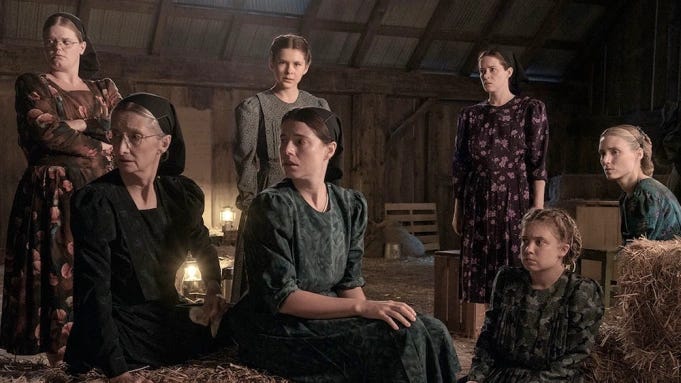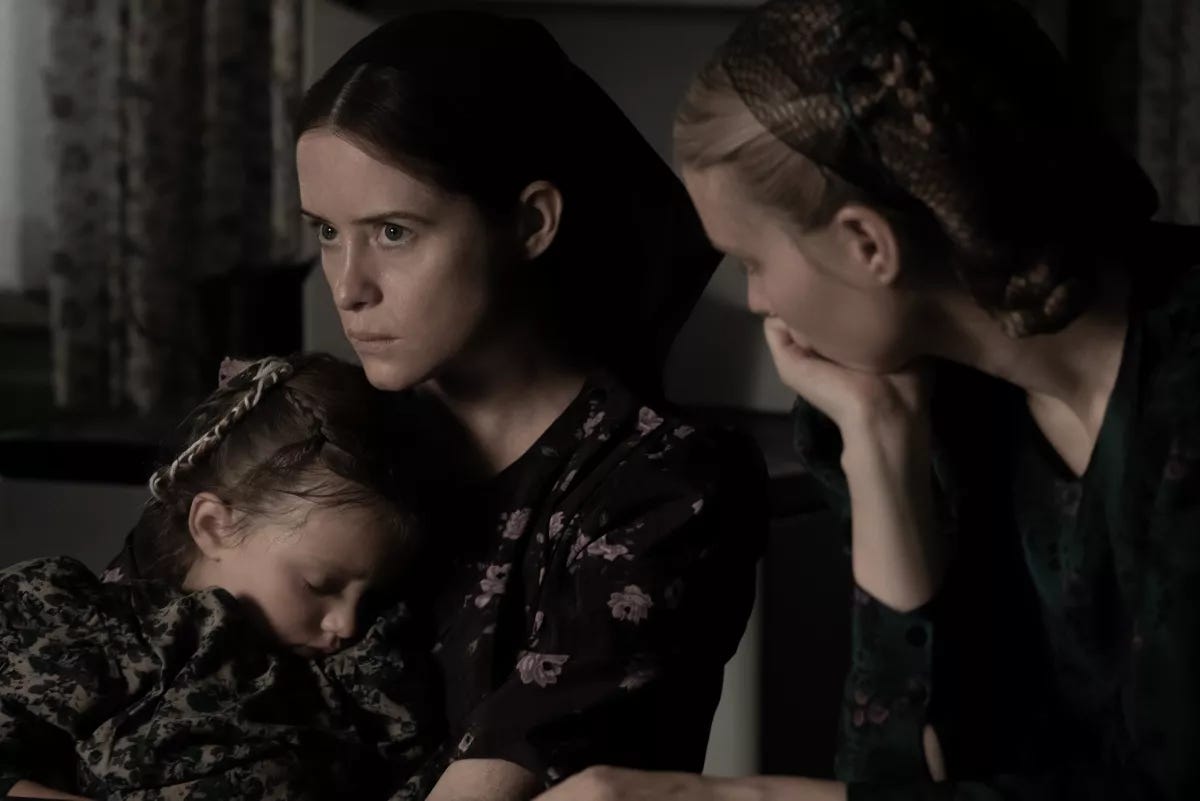(Courtesy of United Artists Releasing)
This weekend, I urge you to go see Sarah Polley’s exquisite film Women Talking when it opens in wide release theaters. It’s not an easy watch, but it’s an important one.
The film is an adaptation of Miriam Toews’s powerful novel of the same name. While the book is technically a work of fiction, it is based closely on a horrifyingly true story. In her “Note on the novel,” Ms. Toews provides the backstory:
Between 2005 and 2009, in a remote Mennonite colony in Bolivia named the Manitoba Colony, after the province in Canada, many girls and women would wake in the morning feeling drowsy and in pain, their bodies bruised and bleeding, having been attacked in the night. The attacks were attributed to ghosts and demons. Some members of the community felt the women were being made to suffer by God or Satan as punishment for their sins; many accused the women of lying for attention or to cover up adultery; still others believed everything was the result of wild female imagination. Eventually it was revealed that eight men from the colony had been using an animal anesthetic to knock their victims unconscious and rape them…Women Talking is both a reaction through fiction to these true-life events, and an act of female imagination.
None of this is a spoiler, for the book is not a mystery about the uncovering of such unspeakable actions which are indeed based on fact. Instead, Women Talking picks up where most stories leave us - in the aftermath of great evil.
The story takes place in the loft of a barn. Eight women - representatives from two families - wash each other’s feet in imitation of their Lord. They knit, they draw, and most importantly they talk. The clock is ticking and they need to decide: what are they going to do now?
(Emily Mitchell, from left, Claire Foy and Rooney Mara in the movie “Women Talking.” (Michael Gibson / Orion Releasing)
Much of the conversation triangulates between three women - the violently protective Salome (“and the gates of hell shall not prevail against her” August writes in his account which forms the basis of the novel), the hopeless and sardonic Mariche, and the mystically astute Ona. No voice is vilified or silenced. Instead, the film gives each woman the space to speak her mind.
While many stories about harassment, rape and their consequences leave viewers with a sort of cynicism that is only qualified by some nebulous female solidarity, Women Talking recognizes the reality that women are different and have different things to say about difficult questions. Solidarity might be an easier story to tell, but Women Talking isn’t interested in the easy answers. Indeed, it wisely reminds us, half of the solution is for women to take the time to sit down and actually discuss problems in order to choose something different for the future.
Polley and her stunning ensemble cast capture the real drama that lies within such a conversation. No explosions or fight sequences are necessary. Just a group of women faced with the greatest task of all: to build a better life for their children. It turns out, ideas are captivating and the weight of a single choice can carry a story.
Ona asks a lot of questions of her fellow women, as the film asks questions of us as we watch. Yet despite everything else that Women Talking questions, it never questions the existence of God. In the wake of such evil, it would be easy to deny the presence of a loving God or a place on earth for those who truly love Him. But as August Epp - the kindly schoolteacher who keeps the meeting’s minutes - notes, it takes greater courage to question “Not God. Power.” Women Talking has that courage.
Women Talking additionally reminds us of the importance of different generations sitting down together for these discussions. Autje and Neitje - the youngest girls - at first grumble over being stuck in the barn attic. As the conversation progresses, they begin to contribute, taking on the mantle of womanhood as they assume responsibility for the most important decision of their community. Meanwhile Agata and Greta - the older women - listen to the wild feelings of their adult daughters, sometimes tempering them, but usually guiding them back towards their guiding principles. “It is because of our faith that we must leave.” Agata says to her daughter Salome. She reminds her daughter to think about “the true, the honest” and everything listed in Phillipians 4:8. The women recite the verse together, reorienting themselves to what is best in them.
At the end of the film, the women commit themselves to three things for a better community. “That our children will be safe, that we may follow our faith, and that we will be able to think.” The world needs more stories oriented to those things.
In a world that prefers to riot, scream, and summarize in 160 characters, Women Talking reminds us of the absolute necessity of conversations - deep, long, intense conversations about the things that matter. The safety of our children, the preservation of our faith and the pursuit of freedom are at stake.
At the end of the film, we see what the point of all the conversation, the jibing and snapping and inconsequential anecdotes. A new kind of community has been formed, one built upon principles of truth and not of power - a community of women. One might almost call it a city of ladies.
Follow us on Instagram: https://www.instagram.com/cityof.ladies/





